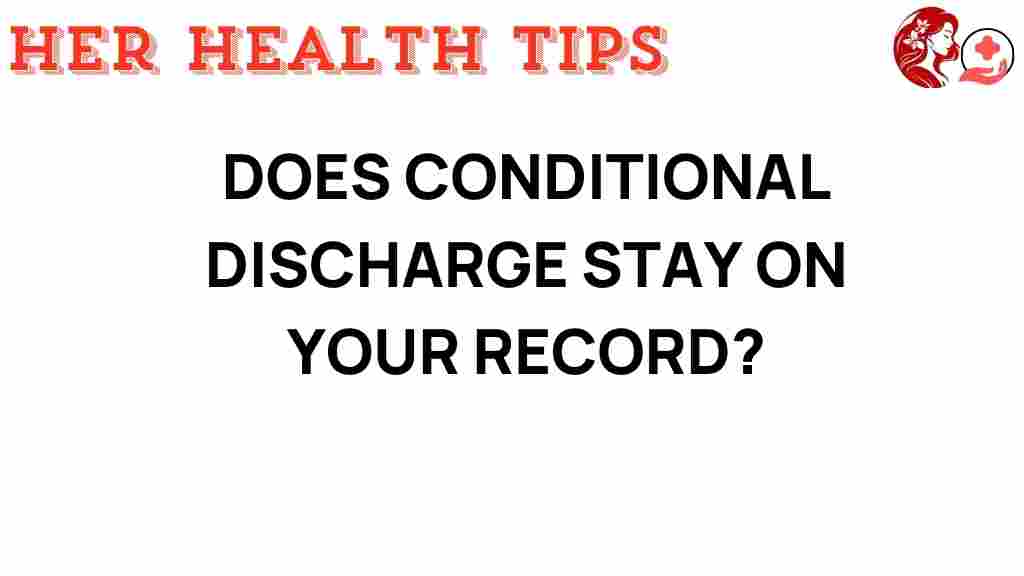Does Conditional Discharge Haunt Your Criminal Record Forever?
When individuals face legal troubles, the outcome can significantly affect their lives. One common question that arises is whether a conditional discharge will remain on their criminal record indefinitely. Understanding the legal implications of a conditional discharge is crucial for anyone who has been involved in the justice system. This article will delve into what a conditional discharge entails, its impact on your criminal record, and the avenues available for expungement and rehabilitation.
What is a Conditional Discharge?
A conditional discharge is a legal ruling often imposed by a judge in criminal cases. It allows a defendant to avoid a criminal conviction if they comply with specific conditions set by the court. If the individual successfully meets these conditions, the charges may be dismissed, and they will not have a criminal record for that offense. This type of ruling is particularly common in minor offenses or first-time incidents.
How Does a Conditional Discharge Impact Your Criminal Record?
Many people wonder if a conditional discharge will haunt their criminal record forever. The answer largely depends on whether the individual fulfills the conditions imposed by the court. Here’s what you need to know:
- A conditional discharge does not result in a criminal conviction if all conditions are met.
- If conditions are violated, the court may revoke the discharge, leading to a conviction.
- Successful completion may lead to a clean record for that particular incident.
Legal Implications of a Conditional Discharge
Understanding the legal implications of a conditional discharge is essential. Here are some key points to consider:
- It does not equate to a guilty plea; rather, it is a chance to avoid a conviction.
- Not all offenses are eligible for a conditional discharge; more serious crimes typically are not.
- The conditions may include community service, probation, or attending rehabilitation programs.
Background Checks and Employment
One significant concern for individuals with a conditional discharge is how it will affect background checks. Employers often conduct background checks to assess a candidate’s criminal history. Here’s how a conditional discharge may play out:
- If you successfully complete the conditional discharge, it typically will not appear on your record.
- Some employers may still see the conditional discharge, depending on how thorough their background checks are.
- Transparency is essential; if asked about prior offenses, it is crucial to provide honest answers.
Steps to Take After a Conditional Discharge
After receiving a conditional discharge, it’s essential to understand the next steps to ensure that you meet all requirements and protect your record:
- Understand the Conditions: Carefully read the conditions of your discharge and comply fully.
- Document Compliance: Keep records of any completed community service or programs.
- Seek Legal Advice: Consult with a legal professional to understand your rights and obligations.
- Consider Expungement: After fulfilling the conditions, inquire about the process for expungement.
Expungement: Clearing Your Criminal Record
Expungement is the process of sealing or erasing a criminal record. Individuals with a conditional discharge may be eligible for expungement once they meet all conditions. Here’s how you can navigate the expungement process:
- Check Eligibility: Not all conditional discharges are eligible for expungement. Consult your lawyer.
- File a Petition: If eligible, file a petition for expungement with the court.
- Attend a Hearing: You may need to attend a court hearing where you will present your case.
- Await the Decision: The court will review your petition and issue a ruling on your expungement.
Rehabilitation and Moving Forward
Rehabilitation is an essential part of the process following a conditional discharge. Engaging in positive activities can not only help you comply with court orders but also assist in rebuilding your life. Here are some ways to focus on rehabilitation:
- Participate in Support Programs: Look for community programs that offer support and guidance.
- Focus on Employment: Seek job training programs to improve your skills and employability.
- Stay Informed: Keep up with legal changes regarding your rights and expungement.
Troubleshooting Common Issues
Despite your best efforts, you may encounter challenges after a conditional discharge. Here are some common issues and tips for troubleshooting:
1. Violation of Conditions
If you accidentally violate the terms of your conditional discharge, it’s critical to act quickly:
- Contact your lawyer immediately to discuss your options.
- Prepare to attend a hearing where you can explain the circumstances.
2. Background Check Issues
If a background check reveals your conditional discharge:
- Gather documentation showing your compliance and completion of the conditional discharge.
- Be prepared to explain the situation to potential employers.
3. Difficulty in Expungement
If your petition for expungement is denied:
- Consult with your attorney about the reasons for denial and possible next steps.
- Consider waiting a period before reapplying, as laws may change.
Conclusion
In conclusion, a conditional discharge does not have to haunt your criminal record forever. By understanding the legal implications, completing your conditions, and exploring options for expungement, you can move forward positively. Remember, seeking legal advice is crucial at every step of the process to ensure you make informed decisions. Engaging in rehabilitation and staying proactive about your future will help you navigate the justice system successfully. For more information on expungement and legal resources, you can visit this helpful resource. If you have specific questions regarding your situation, do not hesitate to reach out to a qualified attorney.
This article is in the category Conditions and created by HerHealthTips Team
